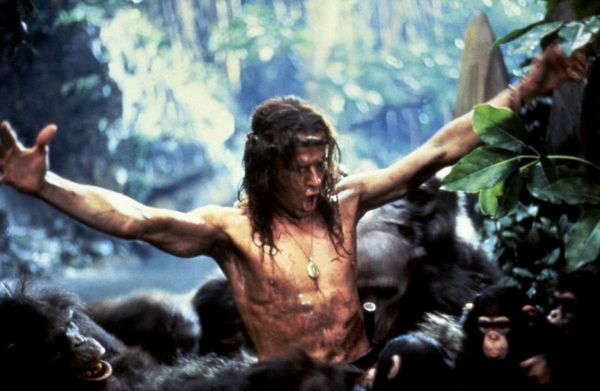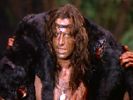Eye For Film >> Movies >> Greystoke (1984) Film Review
Greystoke
Reviewed by: Jennie Kermode

36 years after the last of the Johnny Weissmuller Tarzan films, Hugh Hudson approached Edgar Rice Burroughs' work from a very different angle, sticking closely to the original novel before taking the ape man out of the jungle and plunging him into an impeccably costumed heritage film. The inevitable eroticism of the celebrated savage remains, counterpointed by corsetry and studious repression, but Christopher Lambert's soulful performance (much more potent than the work in the Highlander films for which he is better remembered) creates real emotion where the film might otherwise have descended into camp.
Lambert is ably supported, firstly by Ian Holm as the Walloon explorer who stumbles into him accidentally after being injured in the jungle. This follows lengthy scenes in which the young Tarzan is surrounded only by chimpanzees, sequences blending exquisite nature photography with awful rubber suits. The chimp psychology is fairly well observed (if we allow for the pretence that our hero has comparable strength and would not have been ripped limb from limb in his first fight). It's daring to put an impatient audience through this but it's also vital to balancing the film, with Hudson drawing many sharp parallels with the aristocratic milieu the young man must next learn to navigate.

It is in this latter world, of course, that he meets Jane. She's played by Andie MacDowell but dubbed over by Glenn Close, ostensibly because the accent was wrong but probably a mercy if MacDowell's contemporaneous performances are anything to go by. This enables first a mentorship and subsequently a scandalous romance to develop, but of greater emotional importance to the story is the ape man's relationship with his grandfather, the Earl of Greystoke, ably played by Ralph Richardson. As the elderly aristocrat is inspired to release his own wild side, the distance between apes and men grows a little smaller. In a society obsessed by daring new ideas emerging from the field in natural history, it is this relic of bygone days, adrift in his stately home, who intuitively understands what others struggle to articulate in words.
Physically, Lambert is perfect for the role, steeped in simian body language and immersing himself in his performance. This proves essential to keeping the film on track as it veers into highly sentimental territory, but to pursue a more intellectual narrative would have been to deny the central character his agency. Though the action is more about guns and carriage chases than spears and jungle beasts, the film sticks closely to the spirit of Burroughs throughout, presenting its hero not as stupid but simply as a man out of his element; if he is a noble savage, he is ill at ease with the savagery of the nobility. John Alcott's sumptuous cinematography and a nicely balanced Elgar score add polish to a film which, like Burrough's writing, more than compensates in spirit for what it lacks in depth.
Reviewed on: 30 Apr 2014


















